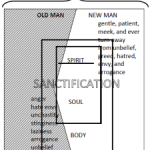
This blog’s own Trent Demarest and his two Pseudepodcast colleagues recently did a show on mortal and venial sin, “Mortal Sin – a light and fluffy topic for a change…”, which I highly recommend checking out (I cover ground here that they also cover in their show, which features more than what is offered here). A guy commenting on their show hits the nail on the head:
“So I’ve listened to last week’s show twice now. What I’ve come away with both times (besides a clearer view of the Lutheran doctrine of moral and venial sin) is that this doctrine, properly understood, pretty much ends any arguments about Lutherans being antinomians.”
That is true – read on to explore this more.
As regards our confession, Lutherans, like Roman Catholics, say that there are both mortal and venial sins (I will admit that I am not really up on what Calvinists believe specifically about the distinction between mortal and venial sins though I don’t doubt this is probably not the whole story).
I John 5 is one of the go-to passages for all who deal with this topic:
13I write these things to you who believe in the name of the Son of God that you may know that you have eternal life. 14And this is the confidence that we have toward him, that if we ask anything according to his will he hears us. 15And if we know that he hears us in whatever we ask, we know that we have the requests that we have asked of him.
16If anyone sees his brother committing a sin not leading to death, he shall ask, and God will give him life—to those who commit sins that do not lead to death. There is sin that leads to death; I do not say that one should pray for that. 17All wrongdoing is sin, but there is sin that does not lead to death.
18We know that everyone who has been born of God does not keep on sinning, but he who was born of God protects him, and the evil one does not touch him.
Rome and Wittenberg are also similar in that both assert that a believer can have true faith in Christ and then lose it.
And yet, there is a huge difference between the Lutheran and Roman Catholic approach to mortal and venial sins. While I do not believe that Lutherans have ever denied that some kinds of sins are not more serious by their very nature – in that they tend to drive out faith in the Holy Spirit, Pastor Will Weedon, echoing Walther, points out where our true emphasis lies:
“I don’t see how any Lutheran can dispense with a term such as that used in our Symbols. Lutherans do have a different approach to mortal sin than Roman Catholics. We don’t have a list. We hold rather that any sin that we regard AS venial IS mortal; i.e., any sin that we seek to excuse rather than repent of – no matter what it is – is a sin that will bring one under condemnation” (from here, quoted on the Pseudopodcast)

The 16th century Lutheran theologian Martin Chemnitz also has some more helpful words for us that go into some depth:
Original sin, which still dwells in the flesh of the reborn, is not idle, but is the restless law of sin in our members, enticing, tempting, driving to sin with various suggestions and evil lusts. Ja 1:14; Ro 7:8; Ga 5:17. Since, then, one who is reborn does not delight in this kind of carnal lusts, and is neither led by them nor follows them, but earnestly represses and crucifies them as sins and mortifies them through the Spirit, lest they rule or be performed (Ro 6:12, 7:15, 8:13; Gl. 5:24), this very thing is a sure sign of true and earnest repentance. And when the reborn pray that God would not impute these weaknesses to them, but forgive them for the sake of Christ, and at the same time believe and trust that Christ, as the true propitiation, would, in the sight of God, cover this their uncleanness with His innocence and obedience (Ro 4:7; Ps 32:1; 1 John 1:7; 2:1-2), this also is a sure sign of true and justifying faith. And where true faith, in earnest repentance, apprehends Christ in the Gospel, and relies on Him and is supported by Him, there is no condemnation, but pure grace of God, forgiveness of sins, and eternal salvation (Rom 8:1:; 1 John 1:9; Ps 32:2). In this way there are and occur venial sins in the reborn, for which they are not condemned, because, as St. Augustine says, they live under grace.
But what if we indulge and delight in evil lusts and seek occasions to give them free reign? Then they become mortal sins (Rom 8:13; Ja 1:15), because there surely is no room for true repentance and faith where the lusts of the flesh are served and given reign, so that they break out into action. It is the nature and particular character of true faith that it does not seek how to commit, continue, and heap up sins freely, but rather hungers and thirsts after the righteousness that releases and frees from sins. Therefore, where there is no true repentance, the Holy Spirit pronounces a very solemn sentence. Jer. 5:3,9; Rom 2:5,9; Luke 13:3; Rv. 2:5. And where there is no true faith, there is neither Christ, nor the Holy Spirit, nor the grace of God, nor forgiveness of sins, nor any salvation. Therefore what? Doubtless the wrath of God, death, and eternal condemnation, unless the fallen are turned to God again. Cl. 3:6; Rom 8:13. As a result of this, therefore, and for this reason mortal sins occur in the reborn, namely when repentance, faith, Christ, and the Holy Spirit are driven out and lost.
Enchiridion, 208, 209

Luther spoke in a similar fashion – and in the most official of documents (the Smalcald Articles). Finally, I add this helpful bit from my pastor:
I think the distinction between mortal and venial sin is important. As far as our justification is concerned, all sins are mortal, as Luther pointed out in the Heidelberg disputation. Imperfection is imperfection, no matter if it is small or larger, no matter if one is aware of it or not. As far as our sanctification is concerned, some sins are venial, some are mortal. Venial sins usually fall under the category of sins which occur not purposely and willfully, but because we are by nature defective. Sometimes we are aware of them, sometimes not. Here the confession of sins of two types in the Small Catechism: Those of which we are not aware, and those of which we are aware. (This distinction goes back to the Old Testament, and the placing of garments on the priest, and the offering of specific sacrifices for unknown sins.) So if we are aware of a sin, does that necessarily mean it is a mortal sin? Well, we can we be aware of sin within us. For example, when something causes us to become angry, and we realize we should not be angry about that thing, and yet we are. At that moment there may be an awareness of the New Man, that the Old Adam has caused such anger, and must simply live with it until that anger subsides. Thus to prevent further or greater sin, the New Man takes the Old Adam for a walk…Here we can talk about non-willful sins, sins which occur because by nature we are defective, and which are a result of the reactions of that defective nature to our situation (we are tired and hungry and so end up yelling at a child when such yelling was not really needed…). But what about “premeditated sin”, that is sin which we commit with the full knowledge that it is sin, and we should not commit it? Here we are working against the Holy Spirit, and have strayed into mortal sin territory. So the chief example in the Bible: David and Bathsheba. Certainly with all the time that lapses during the sequence of events which occurred there there must have been something more than venial sin occurring. We don’t know. What we do know is that as soon as David is confronted with his sin, he does not claim ignorance, that he should not have committed adultery or murdered, but he repents, asks for a clean heart, a right spirit, and that Spirit not be taken from him, that the joy of salvation be restored to him.
I hope all of this is helpful to you as it is me. If this terrifies you, I can only say this: it does me to. This is why confessional Lutherans emphasize that the Christian, throughout his Christian life, continues to need the ongoing forgiveness that is given in the church. We live from the Gospel preached and the sacraments administered. Penitent sinners trust these words of promise so that what is said in I John 1 is true for them: “that you may know that you have eternal life.”
No sin is ultimately mortal to the person who lives by faith in Christ.
FIN
Update: leading up to Reformation day, at my blog theology like a child, I am re-publishing several of my most important posts surrounding this topic. I invite everyone here to check those out – I will probably do one or two here as well.











